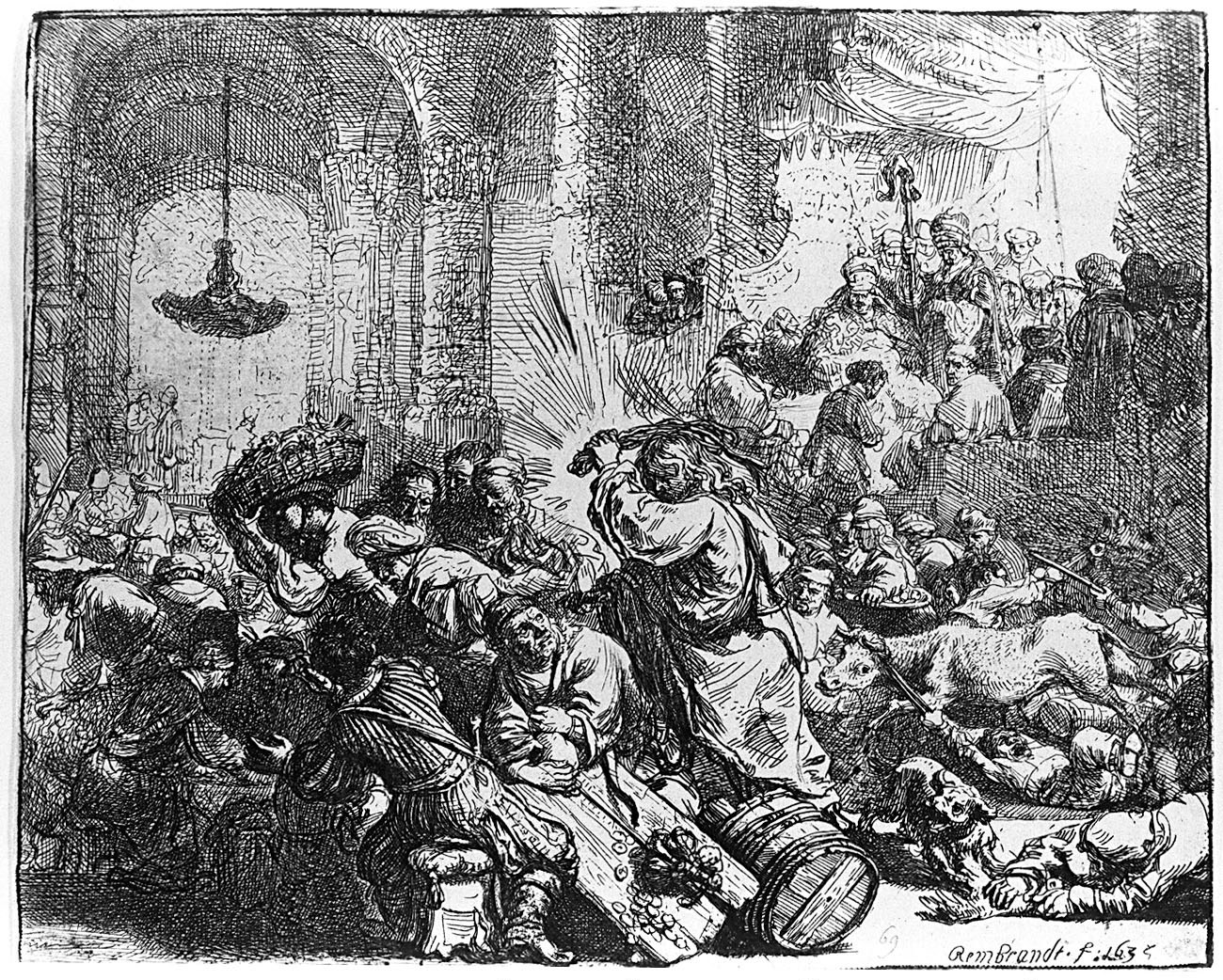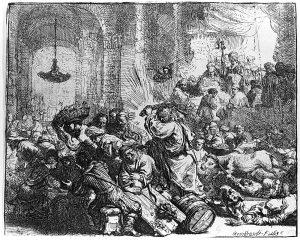

I was raised in the Christian, United Methodist tradition, and it’s a tradition I still [mostly] embrace. I don’t proselytize, but sometimes there is a universality to a message one hears in church, and yesterday was one of those days.
My pastor was preaching on this reading from Scripture:
14 In the temple he found people selling cattle, sheep, and doves, and the money changers seated at their tables. 15 Making a whip of cords, he drove all of them out of the temple, both the sheep and the cattle. He also poured out the coins of the money changers and overturned their tables. John 2: 14-15 (NRSV translation)
Rather than focusing on what is sometimes called the “Temple tantrum”, my pastor zeroed in on the actions that were taken out of a deep and abiding love for not just one’s tradition, but what could be. She also asked us to consider how we could be Overturners-of-Tables, and while that is something I’ll be considering for the foreseeable future, it did prompt me to think about others who have overturned tables. This post features some of them, both obscure and well-known.
James Lawson; in 1968, Dr. King described him as “the leading theorist and strategist of nonviolence in the world.”
Professor of history @GilTroy on James Lawson, the courageous pastor who brought MLK to Memphis https://t.co/gNb7i5ncIn
— The Daily Beast (@thedailybeast) February 24, 2018
Ryan Coogler and Black Panther (I still haven’t seen it, but I will, even if I have to call in sick to work to do so!)
“Black Superheroes Matter: Why a ‘Black Panther’ Movie Is Revolutionary” by @RollingStone https://t.co/yP9h6ccwkG
— Medium (@Medium) February 17, 2018
The Parkland kids, who have inspired many and done much, but this has the potential to become their greatest legacy:
Turning anger into votes: Parkland students inspire other Broward high schoolers to register to vote https://t.co/W6xEjnZktD pic.twitter.com/mzSutVGaON
— WLRN Public Media (@WLRN) March 4, 2018
Marian Wright Edelman, founder of the Children’s Defense Fund
“Dr. King is not coming back – we’re it. He told us what to do. Let’s honor him by doing it.” Marian Wright Edelman at the #MartinLutherKingJr memorial dedication in Washington, D.C. on October 16, 2011. #BlackHistoryMonth #EndChildPoverty pic.twitter.com/49bUsQkfXl
— ChildrensDefenseFund (@ChildDefender) March 1, 2018
Alice Paul, suffragist. (The early 20th century movement was sometimes intersectional on paper, but rarely in practice. Despite this, Alice Paul is worthy of mention for her personal bravery and commitment in working towards the adoption of the 19th Amendment.)
1/ Welcome to women’s history month! Meet Alice Paul, the activist you may never have heard of. Snubbed by traditional suffragists because of her “radical” tactics (lots of pearl-clutching over her hunger strikes and picketing the white house-the horror!). pic.twitter.com/0ZRPwtghiv
— wine-stained lens (@winestainedlens) March 1, 2018
Marjory Stoneham Douglas, an activist who started her most noteworthy work at the age of 79
Don’t give up. That was the key to her half-century battle for saving the Everglades, and I think it applies to gun reform. Today’s column. https://t.co/WsJUqfacTx
— Mary Schmich (@MarySchmich) February 16, 2018
After I wrote about the activism of Marjory Stoneman Douglas, a friend of hers sent me this photo of her at the signing of the Brady Bill. She wanted gun control. pic.twitter.com/LhNEWbGdyR
— Mary Schmich (@MarySchmich) February 19, 2018
Bonus music: To be Table Overturners, we have to Stand Up for Something
#StandUpForSomething Performance during the #Oscars. pic.twitter.com/XMtB2v77gV
— COMMON (@common) March 5, 2018

Good morning, Pond Dwellers and thanks, DoReMi, for another excellent diary. I’d like to think that I’d be a table over turner but that’s something that one has to face to be able to determine what’s inside themselves. However, you’ve provided me with a lot to think about today.
36 and a dry day on tap. Perfect dog walking weather. Now it’s coffee time.
I think some of us are skilled at upending tables. Others are better suited to explain why the tables needed to be overturned. Some do well at explaining the history of how the tables got to be there in the first place (you might be able to tell where I think I fit in). Others provide sanctuary for the table-turners so they can rest and rejuvenate. All are necessary and helpful and useful. But I think knowledge of the actual overturners helps us with the introspection to figure out where we fit in with the Overturning Community.
Good morning meese…Thank you Sher. Once again you’ve given me positive thoughts to think about. The predicament that Bozo Sanders has put us in is a draining everyday thing and I always feel better after reading your diaries.
If it hasn’t become obvious, I’m a glass half full kind of person. I need that positive vision to keep going; if I wasn’t able to find it, I wouldn’t even want to get out of bed every day. (And sometimes I don’t want to anyway, although some of that may be sheer laziness!) On those days of dread and anger, I make a point of asking myself, even before I get out of bed, “What beauty can I create in the world today?” It sounds trite and more than a bit schmaltzy, but since I started doing that, it’s at least helped me roll out of bed and get started.
{{{DoReMI}}} – thank you for the diary, for the double duty. I’ve RT’d the tweets and am pondering the message of the diary or at least of your minister’s sermon. One of the teachings I grew up with is that Jesus wasn’t angry at what they were doing but where they were doing it. Cattle sales belong in a cattle market, not in the temple courtyard. Banking transactions including money changing – something Americans are really not that familiar with but most other places in the world (include Europe pre-Euro) were very familiar with – should be done in a bank, not the temple courtyard. It was a teaching that even appropriate actions have appropriate – and inappropriate – places for doing them. So many of the teachings I’ve seen on that passage since I became an adult had been that the actions themselves were wrong, that Jesus was anti-marketing and especially anti-banking. And using that as an excuse to attack all merchants, all bankers. So I’m thinking when folks call you to be a “table turner” – well, maybe you might want to check on why they want you to turn over those tables first. (Not a comment on your minister but on some aspects of religion – especially Xtian religion – in general.)
Hope you are having a lovely day, moar {{{HUGS}}}
There’s so much written about this episode, as described in all four of the gospels, and the interpretations are all over the place. As a matter of history, the presence of the sellers in the courtyard was intended to be a convenience for the sojourners who were coming long distances; the presence of the moneychangers was a necessity since the Law forbid graven images (and Roman coins invariably showed the head of the emperor). So the interpretation I’ve heard most often was not about the presence of the sellers and moneychangers per se, but that like so many systems, it had become corrupted over time. Animals were being sold for immense profit; the same for the money changing. By turning a system designed to enable Temple worship to become a marketplace of greed, it truly had become a “den of thieves.” Whether Jesus ever actually did the things described by the gospel writers is open to question (at least in my tradition), but it does seem likely that the stories are based on some historical event (even if it wasn’t Jesus). If Jesus was an Essene, as some surmise, it’s quite likely the cleansing of the Temple were his actions; if he wasn’t an Essene, it’s a wide open question.
At any rate, the interpretations most common in my tradition are about systemic corruption and the falling away from divine intent. To my mind, when we start using this story to talk about anti-banking or anti-capitalism or anti-marketing, we’re engaging in proof-texting to accomplish a pre-determined goal. It’s quite possible I’m doing the same thing from my liberal perspective, but at least I know I’m in good company. As one of my college professors always said about engaging with scripture, “Read the words. Understand the history. And only then look for divine intent.”
I – and my mother – totally agree with your college professor. :) – and yes, any system can be – will be – corrupted over time. Our job is mostly to make that time as long as possible. But yes, once the corruption has reached a certain level, it takes a more dramatic response to deal with it. My teaching has Jesus, presupposing there was one, as an Essene. Actually my teaching doesn’t care whether or not there was a single human who said and did the things reported of Jesus – it’s the concepts, the principles behind those stories that are important in my way. moar {{{HUGS}}}
My “faith” is closer to what you describe than any doctrinal adherence, which is why I continue to be uneasy in the church. That, and my indoctrination from an early age in the Wesley quadrilateral (“The phrase which has relatively recently come into use to describe the principal factors that John Wesley believed illuminate the core of the Christian faith for the believer”; the legs of the quadrilateral are Scripture, faith, reason, and experience) are also why I would never be able to attend a church that ascribes to the belief in scripture as the “inerrant Words of God.” From personal experience, I do believe that scripture is a portal to understanding the divine, but I see many churches use scripture as a wall that you must barricade yourself behind. It’s not just ahistorical; it makes God small…as small as humans. What’s the point in even believing there is a divine if you’re going to do that?
There have always been those who could not live up to being made in the image of god – could not even bear the thought of trying to – so had to have a god made in the image of men. And religion as excuse for evil behavior has a long and dishonorable history. sigh.